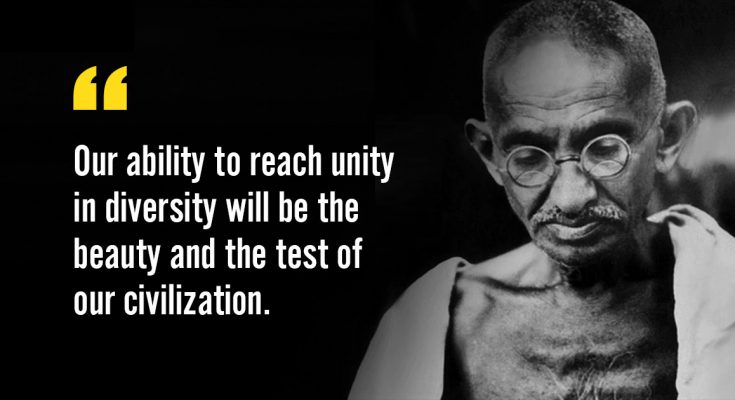Table of Contents
Unity in Diversity Essay -1226 Words
“Our ability to reach Unity in Diversity will be the beauty and the test of our civilization.” Mahatma Gandhi
Have you ever thought about the incredible diversity that exists in India? It’s pretty amazing, is not it? From the many languages and religions to the different customs and traditions, India is a country that truly celebrates its differences. But, as you probably know, diversity also brings challenges. How can we create a unified society when we are all so different? This is where the concept of “unity in diversity” comes in. It is the idea that despite our differences, we can come together and work towards common goals. And let us face it, this concept is especially important in India, where our diversity is one of our greatest strengths.
Historically, “Unity in Diversity ” has been an important concept in many cultures and societies around the world. For example, ancient Indian texts such as the Rigveda and the Upanishads emphasise the unity of all living beings and the importance of respecting diversity and differences. Similarly, the ancient Greeks celebrated diversity through their various city-states, each of which had its own unique culture and tradition.
Indeed, throughout history, diversity has often been a driving force for social progress and innovation. When people from different backgrounds and experiences come together, they bring unique perspectives and ideas that can lead to breakthroughs in science, technology, art and culture. The Renaissance in Europe, for example, was characterised by a flourishing of art, literature and science, largely due to the exchange of ideas between scholars and artists from different regions and backgrounds.
“We may have different religions, different languages, different coloured skin, but we all belong to one human race.” – Kofi Annan
In the modern world, the importance of diversity cannot be overstated. With globalisation and the increasing interconnectedness of people and cultures around the world, it is more important than ever to find ways to work together and respect each other’s differences. Diversity brings new ideas, perspectives and innovations and can help create a more dynamic and inclusive society.
In India in particular, diversity is an integral part of the country’s identity and history. India is home to a multitude of cultures, languages, religions and traditions, all of which have contributed to the country’s rich cultural heritage. From the ancient Indus Valley civilisation to modern Indian democracy, India has been shaped by its diversity and has much to gain from embracing it.
One of the biggest challenges we face in promoting unity in diversity is how to deal with diversity in the workplace and in society. When people from different backgrounds come together, conflicts and misunderstandings can arise due to differences in culture, language and values. It can be difficult to deal with these differences in a way that promotes cooperation and respect, especially in situations where there is an imbalance of power or where people feel threatened or excluded.
“No culture can live if it attempts to be exclusive.” – Mahatma Gandhi
Discrimination and prejudice are also major obstacles to promoting unity in diversity. When people are treated unfairly because of their race, ethnicity, religion, gender or sexual orientation, it can create deep-seated divisions and undermine trust between individuals and communities. Discrimination and prejudice not only harm the individuals concerned, but also undermine the overall goal of building a more inclusive and just society.
To overcome these challenges, it is important to promote a culture of respect, empathy and understanding. This can be done through education and awareness-raising so that people understand and appreciate other cultures and perspectives. It can also be about creating inclusive policies and practises that ensure everyone has an equal opportunity to participate and contribute. In the workplace, for example, this could mean running diversity training programmes, forming affinity groups and promoting diversity in hiring and promotion.
Ultimately, the key to fostering unity in diversity is recognising that everyone has something valuable to contribute, regardless of their background or identity. By creating a culture of inclusion and respect, we can build stronger and more resilient communities that benefit everyone. This is not always easy, but it is a challenge worth taking on if we want to create a better world for ourselves and future generations.
One of the most important strategies to promote unity in diversity is education and awareness raising. When people understand and appreciate the differences that make us unique, they are more likely to work together and build strong relationships across cultural and ethnic boundaries. Education can take many forms, from teaching cultural literacy to community events that showcase different traditions and customs. By creating opportunities for learning and engagement, we can help people develop a greater sense of empathy and understanding for those who are different from themselves.
Another important strategy for promoting unity in diversity is leadership. Whether in the workplace or in the community, leaders play a critical role in setting the tone and fostering a culture of inclusion and respect. By modelling inclusive behaviour and setting expectations for how people should treat each other, they can create an environment where everyone feels valued and supported. This can include everything from creating policies that promote diversity and inclusion to standing up against discrimination and prejudice whenever it occurs.
Finally, there are many benefits to embracing multiculturalism and promoting intercultural dialogue. By bringing together people from different backgrounds, we can create a dynamic and vibrant society that benefits from the unique perspectives and experiences of each individual. Multiculturalism can also help to break down stereotypes and prejudices as people learn about different ways of thinking and living. Through intercultural dialogue, we can promote greater understanding and respect for other cultures, which in turn can lead to more harmony and cooperation between different communities.
Finally, we looked at the concept of unity in diversity and its importance in creating a more inclusive and just society. We have seen that throughout history, examples of unity in diversity can be found in cultures and communities around the world. We have also looked at the challenges and obstacles that can be encountered when dealing with diversity in the workplace and in society, and the strategies that can be used to overcome these challenges and promote greater understanding and respect.
It is clear that promoting unity in diversity is more important today than ever before. As our world becomes more interconnected and diverse, we must find ways to embrace our differences and work towards common goals. This requires a commitment to education and awareness-raising, and a willingness to listen to and learn from others. It also requires strong leadership and a shared sense of purpose as we work together to create a more inclusive and equitable society.
As individuals, we all have a role to play in promoting unity in diversity. We can start by educating ourselves about different cultures and perspectives and seeking opportunities to connect with people from different backgrounds. We can also challenge our own biases and prejudices and work to build relationships based on mutual respect and understanding. As a society, we need to recognise the value of diversity and take action to promote greater inclusion and equity for all.
So let us all call on ourselves to embrace diversity and promote unity in our communities, workplaces and beyond. In this way, we can create a better future for ourselves and future generations.
Unity in Diversity Essay – 150 – 200 words
Unity in diversity is a concept that emphasises the importance of embracing diversity and working towards common goals despite our differences. Throughout history, diversity has been a driving force behind social progress and innovation, from the Mughal Empire in India to the Renaissance in Europe. However, dealing with diversity can also bring challenges, especially in the workplace and in society at large. Discrimination and prejudice can undermine unity in diversity and create divisions and barriers to inclusion.
To promote unity in diversity, we must actively work to overcome these challenges. This means that we need to develop policies and practises that promote diversity and inclusion, and foster a culture of respect and open-mindedness. We also need to challenge our own biases and prejudices and actively seek out different perspectives and experiences. In this way, we can create a more equitable and inclusive society that values our differences and promotes unity.
In summary, unity in diversity is not just a noble ideal, but a practical concept that has contributed to the development of society throughout history. By recognising the importance of diversity and working towards greater unity, we can create a more vibrant, innovative and harmonious world for all.
Unity in Diversity Essay – 250 – 300 words
Unity in diversity is a concept that has prevailed throughout history and continues to be relevant in the modern world. Diversity can be a source of strength, leading to progress and innovation. However, it also brings with it a number of challenges and obstacles.
History is replete with examples of unity in diversity, such as the Mughal Empire in India or the Roman Empire, which united people from different backgrounds under a common rule. Diversity contributed to the development of a rich and diverse society. In the modern world, we can see how important it is to accept diversity in our daily lives. We deal with people from different backgrounds and cultures on a regular basis. By embracing this diversity and learning from each other, we can broaden our perspectives and build stronger and more inclusive communities.
However, dealing with diversity in the workplace and in society can be complex. It can be difficult to ensure that all voices are heard and respected when people from different backgrounds and cultures work together. Discrimination and prejudice are major obstacles on the road to unity in diversity. Discrimination can create a sense of division and resentment and undermine the concept of unity in diversity. Overcoming these challenges is crucial to promoting unity in diversity.
Creating a culture of respect and open-mindedness is essential to overcoming these challenges. We must actively seek to create workplaces and communities where everyone is valued and respected, regardless of their background or identity. Policies and practises that promote diversity and inclusion can help create a more equitable and inclusive society. By challenging our own biases and prejudices and seeking out different perspectives and experiences, we can also help create a more welcoming and inclusive society where everyone has the opportunity to flourish. In summary, by recognising the importance of diversity and working towards greater unity, we can create a more vibrant, innovative and harmonious world for all.



